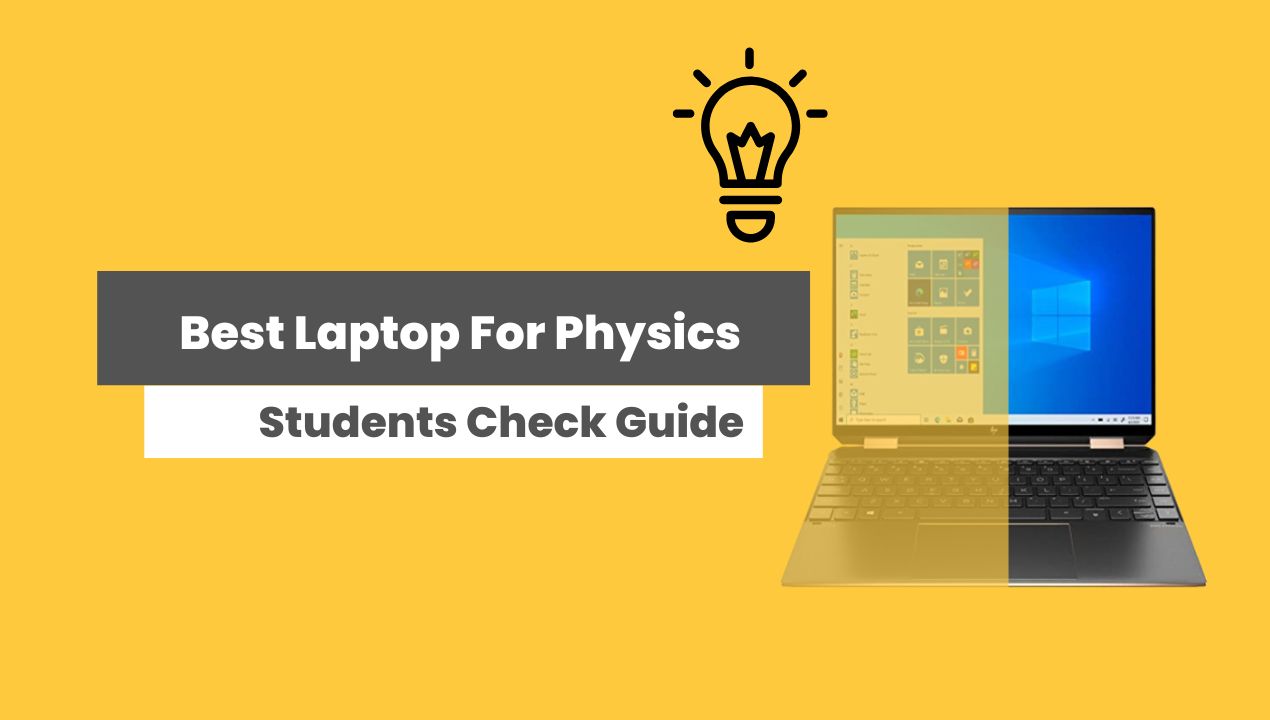A laptop is a small, portable computer that typically has a clamshell form factor, meaning it is composed of two hinged sections that open up to reveal a keyboard and screen. Laptops are convenient because they allow users to take their work with them wherever they go.
When it comes to laptops, there are a few things that physics students need to take into account. First and foremost, you need a processor that can handle complex calculations quickly. An Intel Core i5 or i7 processor will do the trick.
Second, you need a lot of RAM. Again, because of the complex nature of physics calculations, having more RAM will allow your laptop to keep up with your demands. You also need plenty of RAM to keep all of your programs running smoothly – 8GB is a good starting point.
A large solid state drive will also come in handy for storing all of your data; look for one with at least 256GB of storage space.
Third, look for a laptop with a large screen. You’ll be working with many different types of data and visualisations, so having a larger screen will make your work easier.
Finally, make sure your laptop has good battery life. You’ll likely be using your laptop for long periods of time, so you’ll need to be able to rely on it to last through an entire day of work.
A laptop is an important tool for physics students. It can be used to take notes in class, store and organize data, and do research. When choosing a laptop, it is important to consider the type of processor, the size and weight, the battery life, and the price.
As a physics student, you need a laptop that can handle demanding software and large data sets. You also need a laptop that is portable so you can take it to class and to the lab. In this article,
we will recommend the best laptops for physics students and give you a buyer’s guide to help you choose the right one for your needs.
Some of the best laptops for physics students are:
- Apple MacBook Pro
- Dell XPS 13
- Lenovo ThinkPad X1 Carbon.
- HP Specter x360
- ASUS Zen Book 13 Laptop
These laptops all have powerful processors and ample amounts of memory. They also have large screens and are relatively lightweight compared to other laptops on the market.
Apple MacBook Pro:
The Apple MacBook Pro is a great laptop for physics students. It has a lot of features that make it perfect for physics students, like a large screen and a powerful processor. It also has a great design that makes it look professional.
The MacBook Pro is a great choice for physics students who need a powerful and reliable laptop. It has all the features you need to do your work, including a large screen and a fast processor. Plus, it has a sleek design that looks great in any setting.
DELL XPS 13:
The Dell XPS 13 is one of the best laptops for physics students. It has a powerful Intel Core i7 processor and 16 GB of RAM, which makes it great for running physics simulations and other demanding applications. The XPS 13 also has a large 3200×1800 display, which is perfect for viewing complex equations and data sets. And its compact design makes it easy to carry around campus or in your backpack.
Lenovo ThinkPad X1 Carbon:
Lenovo’s ThinkPad X1 Carbon is a great laptop for physics students. It’s lightweight and portable, yet still has a powerful Intel Core i7 processor and 8GB of RAM.
The 14-inch display is perfect for working on complex equations and diagrams, and the backlit keyboard makes it easy to work in low-light conditions.
The ThinkPad X1 Carbon also has some great security features, like a fingerprint reader and an integrated Trusted Platform Module (TPM) chip. This makes it ideal for storing sensitive data, like research papers or lab results.
Overall, the Lenovo ThinkPad X1 Carbon is a great choice for physics students who need a powerful yet portable laptop.
HP Specter x360:
If you’re a physics student, you need a laptop that can handle complex calculations and simulations. The HP Specter x360 is our top pick for physics students. It’s powered by a 8th-generation Intel Core i7 processor and has 16GB of RAM. Plus, it has a large 15.6-inch display with 4K resolution.
So you’ll be able to see everything clearly, whether you’re working on equations or running simulations. And if you need to take your laptop with you to class or to the lab, the HP Specter x360 is portable enough to carry with you.
ASUS Zen Book 13 Laptop
A laptop is an important tool for any physics student. It is a portable computer that allows you to take your work with you wherever you go. There are many different laptops on the market.
So it can be difficult to choose the right one. The ASUS Zen Book 13 is the best recommended laptop for physics students. It has a powerful processor and plenty of memory, so it can handle even the most demanding tasks.
The graphics card is also great for visualizing data and simulations. In addition, the laptop is lightweight and has a long battery life, so you can take it with you anywhere.
Samsung Notebook 9 Pro
The Samsung Notebook 9 Pro is one of the best laptops for physics students. It has a powerful processor and a large amount of RAM, making it ideal for running complex physics simulations.
The notebook also has a large, high-resolution display, which is perfect for viewing data and analyzing results. Overall, the Samsung Notebook 9 Pro is an excellent choice for physics students who need a powerful and capable laptop.
In addition, the Notebook 9 Pro’s battery life is excellent, meaning students can use it for long days in the lab or in class.
Laptop for physics students, System Requirements:
When it comes to selecting a laptop for physics students, there are a few key system requirements to consider. First and foremost, processing power is essential for running physics simulations and data analysis software.
Look for a laptop with at least an Intel Core i5 or AMD Ryzen 5 processor to ensure smooth performance. Additionally, a minimum of 8GB of RAM is recommended to handle complex calculations and multitasking.
Since physics often involves working with large datasets and graphical representations, a dedicated graphics card is beneficial.
Aim for a laptop with a discrete graphics card, such as an NVIDIA GeForce GTX or AMD Radeon RX series, with at least 4GB of VRAM.
Storage is another crucial factor. Opt for a laptop with a solid-state drive (SSD) rather than a traditional hard drive, as SSDs provide faster data access and improved overall system responsiveness.
A capacity of 256GB or higher is recommended to accommodate physics-related software and files.
Lastly, consider the display quality and size. A laptop with a Full HD (1920×1080) or higher resolution display will ensure clear visuals for studying graphs and visualizing data.
A screen size of 13 to 15 inches strikes a balance between portability and viewing comfort.
Remember, these recommendations can vary depending on specific software requirements or personal preferences.
It’s always a good idea to check with your university or professors for any additional recommendations.
Buying Guide:
Whether you’re a student or a professional, if you’re looking for a laptop to do physics calculations, there are a few things you need to keep in mind. Here is a guide to help you find the best laptop for physics students.
First and foremost, you need a powerful processor. Physics calculations are very processor intensive, so you’ll need a laptop with at least an Intel Core i5 or i7 processor.
You should also look for a laptop with plenty of RAM; 8GB is a good starting point.
A large monitor is also important for physics students. A 15-inch or larger display will make it easier to view complex equations and diagrams.
A high-resolution display is also helpful; 1080p is ideal but 1440p is even better.
Our Thought:
So for you we if you are good with budget buy Apple MacBook Pro which provides a good display, faster performance and a good battery time.
FAQ’s:
What Laptops do physicists use?
Physicists often rely on laptops that offer powerful processing capabilities and portability. Some popular choices include the MacBook Pro, Dell XPS, Lenovo ThinkPad, and HP Spectre.
It’s important for physicists to consider factors like processor speed, RAM, storage capacity, and graphics capabilities when selecting a laptop for their computational needs.
Ultimately, the choice depends on personal preferences and specific requirements for simulations, data analysis, and programming tasks.
Do physics students need a laptop?
Yes, physics students can benefit from having a laptop. It allows them to access online resources, perform simulations, analyze data, and collaborate with peers. Additionally, they can use software tools for mathematical calculations and coding.
However, it’s important to choose a laptop with sufficient processing power and storage capacity to handle physics-related tasks effectively.
Is MacBook Pro good for physics students?
Which MacBook should I buy in 2019 as a physics student? If you’re a moderate to heavy computer user, you probably want a MacBook Pro 13” with 16 GB RAM. If you’re okay with slower performance and want to save a few hundred dollars, check out the new MacBook Air.
What should be the price point of a laptop for a physics student?
For a physics student, an ideal laptop price point would be around $800 to $1,200. Look for a machine with a fast processor (Intel Core i5 or higher), at least 8GB of RAM, and a solid-state drive (256GB or more). A dedicated graphics card is unnecessary, but a high-resolution display can enhance data visualization.
What laptop can run AutoCAD smoothly?
Best Laptops for AutoCad and VR Viewing—Dell Precision 5560 Workstation Intel Core i7. Dell’s Precision 5560 Workstation laptop is perfect for running AutoCAD smoothly. The laptop has a 4 GB NVIDIA Quadro graphics card and built-in thermal cooling technology that prevents the machine from overheating.
How much RAM do I need for AutoCAD?
AutoCAD (including Mental Ray rendering) is actually fairly light on RAM requirements and Autodesk only recommends 8GB of RAM. However, given the relatively low cost of RAM – and the fact that most users tend to have more than just AutoCAD running on their system – we feel that 32GB is a great starting point.
Which processor is best for online classes?
For attending online classes and doing sufficient multitasking, an Intel Core i3-powered laptop is good enough. The next thing to consider is how much RAM a budget laptop brings aboard. Most budget laptops will have 4GB RAM, which again isn’t ideal but for basic tasks it’s acceptable.


